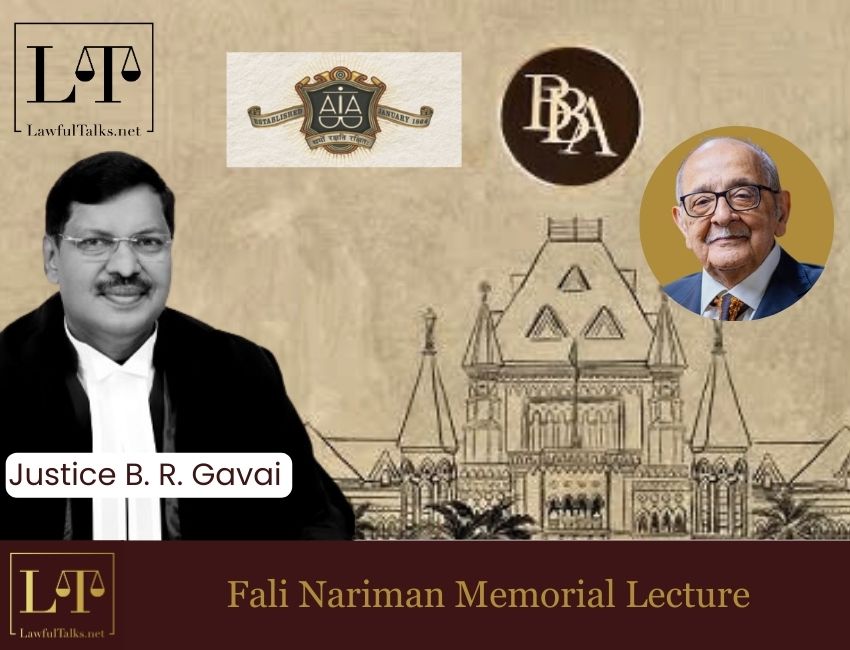Allahabad HC Sets Aside Afzal Ansari's Conviction, Allows Him to Continue as MP

On 6th December, 2024, Justice Bhushan R. Gavai delivered a keynote address at the inaugural of Fali Nariman Memorial Lecture, highlighting 'Fali Nariman's Role in Shaping Constitutional Jurisprudence'.

The address had a nostalgic start by Justice Gavai taking a trip down the memory lane while recalling his days in the Bombay High Court and then acknowledging Mr. Fali S. Nariman’s outstanding service to the legal profession, marked by his unwavering dedication to the cause of justice. Justice Gavai characterized Mr. Nariman as transcending the role of a distinguished advocate, describing him as a custodian of "constitutional values, defender of justice and advocate for the rule of law."
Justice Gavai, recalling the exceptional career of Mr. Fali S. Nariman, spanning over seven decades, mentioned that it is not possible to comprehensively reflect on such an extensive professional journey in a short span of time. Consequently, he structured his address into specific categories to encapsulate and highlight key aspects of Mr. Nariman's exemplary contributions to the legal profession including his instrumental role in shaping constitutional Jurisprudence, Life and Legacy and landmark cases.
Justice Gavai stated that the legacy of Mr. Nariman provides a lens to understand the larger role of lawyers in a constitutional democracy. He emphasized the role of lawyers in constitutional democracy and shaping constitutional discourse. He also noted that beyond their formal role in the courtroom, lawyers serve as catalysts for social transformation by influencing public policy and drawing attention to pressing social issues.
He further stated that Mr. Nariman’s role was particularly significant during a transformative period following the adoption of India’s Constitution, as he and his peers were tasked with not just interpreting the law, but establishing legal precedents. The Constitution was new, and the jurisprudence around it was yet to be developed. This generation of lawyers, including Mr. Nariman, was responsible for creating a body of authoritative rulings that would be the light guiding the Judiciary for generations to come. Their work ensured that the Constitution evolved from a mere document to a living, breathing framework, with constitutional values embedded in the very fabric of governance.
Justice Gavai moved on to Mr. Nariman’s professional accomplishments focusing on the landmark cases in which Mr. Nariman was involved. One of the earliest notable contributions put forth was the landmark case of Golak Nath v. State of Punjab 1967 AIR 1643, where Mr. Nariman appeared as junior counsel. The case was groundbreaking, as it challenged the extent of Parliament’s power to amend the Constitution, particularly concerning fundamental rights. The Supreme Court's decision in this case laid the foundation for the debate on the limits of constitutional amendments. He further highlighted Mr Nariaman’s integral contribution towards the evolution of the basic structure doctrine, which now forms the bedrock of India's constitutional jurisprudence.
Justice Gavai regarded Mr. Nariman was a staunch advocate for the independence of Judiciary and his contribution through his arguments in landmark cases such as the second judges case and the third judges case and they were instrumental in preserving the autonomy and independence of the judiciary in India.
Justice Gavai then went on to discuss Mr. Nariman's involvement in cases concerning the fundamental rights of citizens.
Referring to Air India v. Nergesh Meerza & Ors., 1981 AIR 1829, where Air India's guidelines of terminating services of air hostess after first pregnancy were challenged, Justice Gavai pointed out that despite appearing for Air India, Mr. Nariman convinced the management to do away with this arbitrary guideline.
Another noteworthy moment in Mr. Nariman's career which was highlighted by Justice Gavai was his resignation in protest during the Emergency in 1975. He opposed the controversial Additional District Magistrate v. Jabalpur v S. S. Shukla & Ors 1976 AIR 1207, which upheld the suspension of fundamental rights during the Emergency, and expressed his disapproval by resigning from his post as additional solicitor general. This act demonstrated his commitment to the constitutional values of freedom and justice. He also mentioned the Karnataka-Tamil Nadu water dispute case, where Mr. Nariman represented Karnataka and informed the Court that he would not argue for the state until the Supreme Court's order to release water to Tamil Nadu was complied with.
Justice Gavai recalled Mr. Nariman’s involvement and his controversial role in the Union Carbide Corporation v Union Of India, 1992 AIR 248 case to further exemplify his complex legal career. In the Bhopal Gas Tragedy case, despite facing criticism for representing Union Carbide, Mr. Nariman defended the principle of providing legal representation to all parties in order to ensure a fair trial, underscoring the ethical dilemmas lawyers often face.
The address concluded with Justice Gavai commenting that Mr. Nariman shaped public discourse through his role as authoring books and articles, giving interviews on key issues and mentoring young members of the Bar and law students.

Akshaj Joshi
Law Student
Latest Posts
Categories
- International News 19 Posts
- Supreme Court 352 Posts
- High Courts 366 Posts




























































































































































































































































































































































































































































































































































































































































































































































